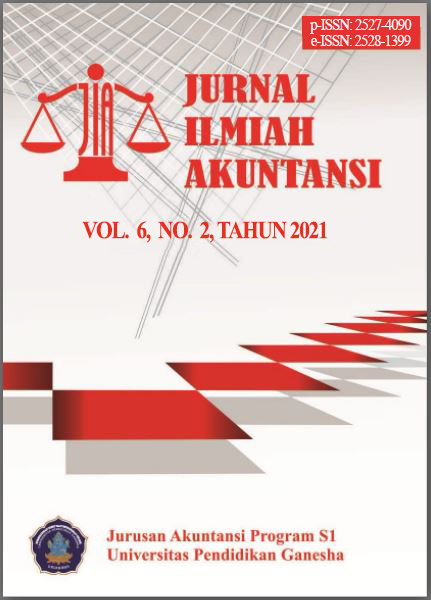Bribery in Government Agency: A Phenomenological Study
DOI:
https://doi.org/10.23887/jia.v6i2.34951Keywords:
Bribery, Bribery detection, Fraud Pentagon Theory,Abstract
The bribery case in Indonesia has always been sticking out all the time. In the last ten years, bribery has always been the most cases handled by the KPK. This phenomenon often sticks out, and the lack of research on the detection of bribery has attracted researchers to research and explore the detection of bribery in government agencies. This study used a qualitative method with a phenomenological approach and data analysis assisted by the Nvivo software. Based on the results of this research, every people have the right to detect bribery, but this right is limited, and not all have the ability. The perpetrators of bribery can come from internal and external organizations. There is a stimulant for the perpetrator to commit bribery which is also stated in the fraud pentagon theory. The results of this study are expected to contribute to auditors in conducting forensic audits and investigations and organizations in making policies related to anti-fraud policies. It is hoped that future research can expand the research construct on the detection of bribery.
References
ACFE. (2017). Survai Fraud Indonesia 2016. Report. Jakarta: Association of Certified Fraud Examiners.
ACFE. (2020). Survei Fraud Indonesia 2019. Report. Jakarta: Association of Certified Fraud Examiners.
ACFE. (2021). Fraud Tree. Association of Certified Fraud Examiners. https://www.acfe.com/fraud-tree.aspx [Feb 26, 2021].
Albrecht, W. S., Albrecht, C. O., Albrecht, C. C., & Zimbelman, M. F. (2019). Fraud Examination (6th ed.). Boston: Cengage Learning.
Basuki, S. (2010). Metode Penelitian. Jakarta: Wedatama Widya Sastra.
BPK. (2020). Transparan Pertanggungjawabkan Anggaran, BPK Beri Kemensos Predikat Terbaik. https://www.bpk.go.id/news/transparan-pertanggungjawabkan-anggaran-bpk-beri-kemensos-predikat-terbaik [Feb 26, 2021].
Cahyono, W. H., & Aisyah, R. H. S. (2020). Kewenangan Pejabat Kantor Pelayanan Perbendaharaan Negara dalam Pengelolaan Keuangan Negara di Daerah. Jurist-Diction, 3(2), 745–764.
Cressey, D. R. (1953). Other People's Money: A Study in the Social Psychology of Embezzlement. New Jersey: Patterson Smith.
Creswell, J. W., & Poth, C. N. (2018). Qualitative Inquiry and Research Design: Choosing Among Five Approaches (4th ed.). California: Sage Publication.
Daurrohmah, E. W. (2018). Efektivitas Audit Forensik dalam Mendeteksi Suap dengan Dukungan Whistle-Blowing. Thesis Universitas Islam Indonesia.
Edwards, R., & Holland, J. (2020). Reviewing Challenges and the Future for Qualitative Interviewing. International Journal of Social Research Methodology, 23(5), 581–592.
Halbouni, S. S., Obeid, N., & Garbou, A. (2016). Corporate Governance and Information Technology in Fraud Prevention and Detection: Evidence from the UAE. Managerial Auditing Journal, 31(6/7), 589–628.
Hardani, H. A., Ustiawaty, J., Istiqomah, R. R., Fardani, R. A., Sykmana, D. J., & Auliya, N. H. (2020). Metode Penelitian Kualitatif & Kuantitatif. Yogyakarta: CV Pustaka Ilmu Group.
Hazami-Ammar, S. (2019). Internal Auditors' Perceptions of the Function's Ability to Investigate Fraud. Journal of Applied Accounting Research, 20(2), 134–153.
ISO 37001:2016 Sistem Manajemen Anti Penyuapan.
Kaptein, M., & van Helvoort, M. (2019). A Model of Neutralization Techniques. Deviant Behavior, 40(10), 1260–1285.
KPK. (2021). Statistik TPK Berdasarkan Jenis Perkara. Komisi Pemberantasan Korupsi. https://www.kpk.go.id/id/statistik/penindakan/tpk-berdasarkan-jenis-perkara [Feb 26, 2021].
Mapuasari, S. A., & Mahmudah, H. (2018). Korupsi Berjamaah: Konsensus Sosial atas Gratifikasi dan Suap. Integritas, 4(2), 159–176.
Marks, J. (2012). The Mind Behind the Fraudsters Crime: Key Behavioral and Environmental Elements. US: Crowe Horwarth LLP.
Miles, M. B., Huberman, A. M., & Saldana, J. (2014). Qualitative Data Analysis: A Methods Sourcebook (3rd ed.). USA: Sage Publication.
Moleong, L. J. (2017). Metodologi Penelitian Kualitatif (36th ed.). Bandung: PT Remaja Rosdakarya.
Prabowo, H. Y. (2020). Retooling Our Anti-Corruption Arsenals: Exploring the Potential Use of CAQDAS in Corruption Investigation. Journal of Money Laundering Control.
Prenzler, T. (2019). What Works in Fraud Prevention: A Review of Real-World Intervention Projects. Journal of Criminological Research, Policy, and Practice, 6(1), 83–96.
Rachman, B. L. (2018). Tinjauan Hukum Atas Sanksi Tindak Pidana Korupsi Sebagai Kejahatan Luar Biasa di Indonesia. Lex Et Societatis, 6(2), 63–75.
Undang-Undang Nomor 20 Tahun 2001 Tentang Pemberantasan Tindak Pidana Korupsi.
Ramadhan, A. (2021). Kasus Suap Bansos , KPK Dalami Pemberian Uang ke Dirjen Linjamsos dan Pihak Lain di Kemensos. https://nasional.kompas.com/read/2021/01/25/21020161/kasus-suap-bansos-kpk-dalami-pemberian-uang-ke-dirjen-linjamsos-dan-pihak [Feb 26, 2021].
Rustendi, T. (2018). Fraud: Pencegahan dan Pengungkapannya dalam Perspektif Audit Internal. Bandung: Mujahid Press.
Serafeim, G. (2014). Firm Competitiveness and Detection of Bribery. In Harvard Business School, 14(012), 1-35.
Shonhadji, N., & Maulidi, A. (2021). The Roles of Whistleblowing System and Fraud Awareness as Financial Statement Fraud Deterrent. International Journal of Ethics and Systems.
Suartini, N. W., & Atu Dewi, A. A. I. A. (2019). Aspek Kriminologis White Collar Crime dalam Tindak Pidana Korupsi di BUMN. Journal Ilmu Hukum, 8(8), 1–16.
Sudarmanto, E. (2020). Manajemen Risiko: Deteksi Dini Upaya Pencegahan Fraud. Jurnal Ilmu Manajemen, 9(2), 107–121.
Syahputra, B. E., & Urumsah, D. (2019). Deteksi Fraud Melalui Audit Pemerintahan yang Efektif: Analisis Multigrup Gender dan Pengalaman. Jurnal Akuntansi Dan Bisnis, 19(1), 31–42.
Universitas Udayana. (2016). Metode Penelitian Kualitatif. Bali: Universitas Udayana.
Urumsah, D., Wicaksono, A. P., & Hardinto, W. (2018). Pentingkah Nilai Religiusitas dan Budaya Organisasi untuk Mengurangi Kecurangan?. Jurnal Akuntansi Multiparadigma, 9(1), 156–172.
Wahyuni-TD, I. S., Haron, H., & Fernando, Y. (2021). The Effect of Good Governance and Fraud Prevention on Performance of the Zakat Institutions in Indonesia: a Shari'ah Forensic Accounting Perspective. International Journal of Islamic and Middle Eastern Finance and Management, 14(1).
Widjojanto, B. (2017). Kajian Awal Melacak Korupsi Politik di Korporasi. Integritas, 3(1), 31–52.
Wolfe, D. T., & Hermanson, D. R. (2004). The Fraud Diamond: Considering the Four Elements of Fraud. Journal of Accounting Research, 32(1), 18–54.



1.png)


